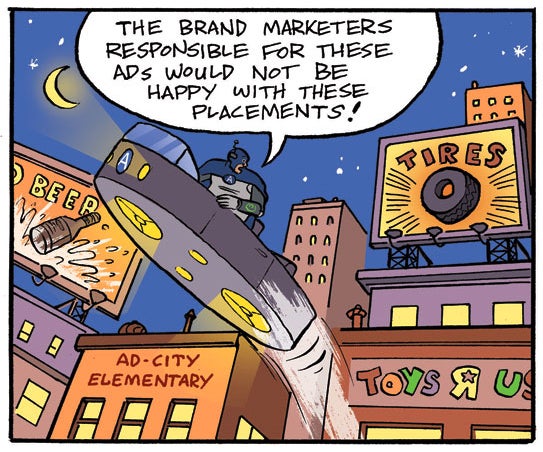Judge me if you will, but my go-to binge program on streaming over the past year has been “Criminal Minds,” a show about serial killers and the federal behavioral analysts who hunt them.
Although “Criminal Minds” is arguably rather cerebral, it’s also rather violent. I mean, it’s a show about catching serial murderers; what do you expect?
I watch “Criminal Minds” on the $7.99-a-month ad-supported version of Hulu, so I see a heck of a lot of ads.
Right before or just after gruesome scenes depicting straight-up murder and torture, I’ve been served ads for Prudential, Chanel (available at Macy’s), Chevrolet, Bob’s Discount Furniture, Avocado Green Mattress (through a tie-in with Disney’s “Strange World”), Sonic and Westin Hotels & Resorts, to name just a few.
There’s nothing wrong with showing me these ads (other than the fact that I’m not in the market for insurance, perfume, cars, furniture or a new mattress, I’m not planning a vacation and I’ve never eaten at a Sonic in my life).
My question is, why is it considered a brand safety issue for advertisers to buy against news content when it’s clearly not an issue for national brands to advertise against violent, albeit fictional, content elsewhere?
Look, there’s an episode of “Criminal Minds” in which a delusional man with an evil twin eats his ex-girlfriend’s head and brain. He keeps it under a plastic cloche dome in his fridge (to maintain its freshness, I assume). He also makes his victims eat parts of it before he kills them.
Just saying.
One answer as to why it’s seemingly OK to advertise against “Criminal Minds” on Hulu (and believe me, I love “Criminal Minds”) is because it’s treated as premium content on a premium channel – CTV, ooh, ahh – but news content about COVID-19, gun violence, the war in Ukraine or the recession (are we in one, are we not in one … can someone give me a straight answer, please?!) makes advertisers nervous.
 And then there are those advertisers that do support the news and end up getting raked over the coals when something goes wrong, even if it’s not their fault.
And then there are those advertisers that do support the news and end up getting raked over the coals when something goes wrong, even if it’s not their fault.
Remember that (admittedly) beyond unfortunate Applebee’s ad adjacency on CNN last February?
For those who don’t recall, imagine a camera panning over the eerily still streets of Kiev as the mournful sound of an air raid siren rings out on Day One of the Russian invasion – and then, suddenly, the screen fills with a close-up of chicken-fried food porn followed by a dancing cowboy shaking his butt to an upbeat Zac Brown Band song. The Kiev scene is pushed into the corner, but still visible as Zac Brown croons about his affection for “a cold beer on a Friday night” and “a pair of jeans that fit just right.”
Applebee’s issued a statement to say it was “deeply concerned about the situation in Ukraine” and that it had immediately reached out to CNN to pause its ads on their network.
But why was Applebee’s excoriated for an ill-timed ad (the timing of which was CNN’s fault) when violent entertainment content is easily able to attract blue-chip advertisers and nobody breaks a sweat?
To be fair, advertisers typically don’t get to know exactly where their ads are running on CTV, so they’re not aware whether their burger spot appeared within a wholesome episode of “Young Sheldon” or just after a character on “Criminal Minds” took a bite out of his ex-girlfriend’s brain.
My point is this: If a brand is willing to take the risk that its ads might appear near content about vicious serial killers, it doesn’t make a lot of sense that they’re uptight about their ads appearing alongside legitimate, hard-earned news reporting, even if it’s not all sunshine and rainbows.
That’s not to say advertisers don’t deserve controls – they do. Or that content like “Criminal Minds” doesn’t deserve to be monetized. It does.
But when is the industry going to call BS on the brand safety double standard?
Follow Allison Schiff (@OSchiffey) and AdExchanger (@adexchanger) on Twitter, for as long as Twitter lasts.
“Data-Driven Thinking” is written by members of the media community and contains fresh ideas on the digital revolution in media.
For more articles featuring Allison Schiff, click here.














